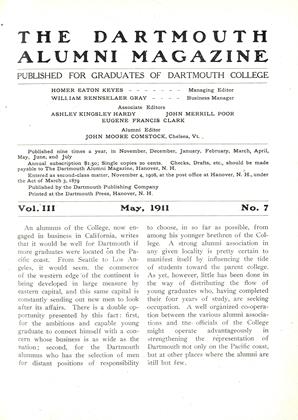in business in California, writes that it would be well for Dartmouth if more graduates were located on the Pacific coast. From Seattle to Los Angeles, it would seem, the commerce of the western edge 'of the continent is being developed in large measure by eastern capital, and this same capital is constantly sending out new men to look after its affairs. There is a double opportunity presented by this fact: first, for the ambitious and capable young graduate to connect himself with a concern whose business is as wide as the nation; second, for the Dartmouth alumnus who has the selection of men for distant positions of responsibility to choose, in so far as possible, from among his younger brethren of the College. A strong alumni association in any given locality is pretty certain to manifest itself by influencing the tide of students toward the parent college. As yet, however, little has been done in the way of distributing the flow of young graduates who, having completed their four years of study, are seeking occupation. A well organized co-operation between the various alumni associations and the- officials of the College might operate advantageously in strengthening the representation of Dartmouth not only on the Pacific coast, but at other places where the alumni are still but few.
Easter is now past and with it the two weeks recess, which comes timely each year as overshoes and patience with recalcitrant spring wear out together. Even now in shadowed corners the piled snow lingers, and the digger for parsnips finds his garden still underlaid with ice. The buds may be swelling on the trees, but the longer April shadows are even yet cast skeleton-wise across the heaving, rutted roads. There are some persons who profess to believe that climate as a general proposition has of late years shown a tendency toward amelioration. "Where are the old-fashioned winters that our grandfathers knew ? Where are the snows of day before yester-year ?" they inquire. Kind friends, let it be answered that, like all good things, they are to be found right here in Hanover. And byway of proof a table is herein spread that exhibits the pranks of Boreas for three generations past. For the better part of a century there has been little change: some winters have been colder than others; but none of them has been warmer than usual. The coal bin of today must needs be stacked as was of yore the wood pile; January still weaves its veils of frozen mist across the valley; February chokes the roads with snow; and the optimistic gardener who .plants beans in April is sure to have them bitten by a frost in May.
As the Tuck School of Administration and Finance at Dartmouth College was the first business school to arrange its curriculum with a view to the largest development of administrative insight and executive power, it is peculiarly fitting that it should be the first to recognize the possibilities of the recent movement for the application of scientific methods in business to the end of securing maximum efficiency. The October conference of which the School will be the source and center should be of inestimable service to New Hampshire and to the neighboring states. Its influence in increasing the prestige of the Tuck School should likewise be very great; for, if it is an important function of such an institution to keep alertly abreast of the thought of the modern world of business and finance, no better proof of fulfilment could be found than in the judgment and skill which has conceived of such a conference and succeeded in bringing to Hanover so notable a gathering of experts. The purpose of the series of meetings is well set forth in an announcement which Director Person has recently issued:
"Notwithstanding the fact that much has been written concerning 'Scientific Management' in newspapers and magazines, there is, nevertheless, no definite conception in the minds of manufacturers and business men of its exact nature, what has been accomplished by it and what it is hoped may be accomplished. Some are convinced that it is the most promising device yet presented for increasing the efficiency of both management and labor and consequently for increasing at the same time profits and wages. Others believe that it is too ideal for practical application. It is probable, however, that the large majority have made up their minds neither one way nor the other, because they feel that they are not sufficiently informed concerning it, and would welcome the opportunity to hear a full and logical explanation of 'Scientific Management by those who have developed it.
"The purpose of this conference is to offer such an opportunity to the manufacturers and business men of New Hampshire and of neighboring states. The conference is intended to be a serious inquiry, and there is no presumption either in favor of or against 'Scientific Management-' The programme is so arranged as to secure a complete and logical presentation of the system and to permit the discussion of its applicability to the various classes of business in which those who attend the conference may be interested. Furthermore, the programme is arranged to give opportunity for discussion of the application of the principles of scientific management to the affairs of states and municipalities."
 View Full Issue
View Full Issue
More From This Issue
-
 Article
ArticleWINTER WEATHER RECORDS AT HANOVER, N. H.
May 1911 By J.M. Poor -
 Article
ArticleFACULTY WORK FROM THE INSIDE
May 1911 By Charles F. Richardson -
 Class Notes
Class NotesLOCAL ASSOCIATIONS
May 1911 -
 Article
ArticleTuck School Conference on Scientific Management
May 1911 -
 Article
ArticleBaseball
May 1911 -
 Class Notes
Class NotesCLASS OF 1908
May 1911 By Laurence M. Symmes









